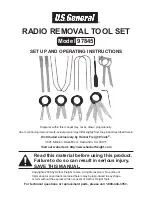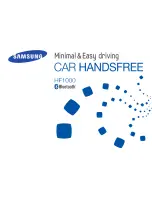
Do not remove the heat shields installed and
never apply undercoating to them. Make sure
that flammable materials, e. g. hay, leaves,
grass, etc. do not come in contact with the hot
exhaust system while driving, while in idle po‐
sition mode, or when parked. Such contact
could lead to a fire, resulting in an increased
risk of serious personal injury as well as prop‐
erty damage.
Do not touch hot exhaust pipes; otherwise,
there is a danger of getting burned.◀
Climate control windshield
The marked area is not covered with heat re‐
flective coating.
Use this area for garage door openers, devices
for electronic toll collection, etc.
Climate control laminated tinted
safety glass
The vehicle glass provides full protection
against the harmful effects of UV radiation on
the skin.
Mobile communication devices in the
vehicle
Mobile communication devices in the ve‐
hicle
It is not recommended to use mobile phones,
such as mobile phones, in the vehicle interior
without a direct connection to an external aer‐
ial. Otherwise, the vehicle's electronics and
mobile communication devices can interfere
with each other. In addition, there is no assur‐
ance that the radiation generated during trans‐
mission will be conducted away from the vehi‐
cle interior.◀
Hydroplaning
Hydroplaning
When driving on wet or slushy roads, re‐
duce your speed to prevent hydroplaning.◀
On wet or slushy roads, a wedge of water can
form between the tires and road surface.
This phenomenon is referred to as hydroplan‐
ing. It is characterized by a partial or complete
loss of contact between the tires and the road
surface, ultimately undermining your ability to
steer and brake the vehicle.
Driving through water
Observe water level and speed
Do not exceed the maximum water level
and maximum speed; otherwise, the vehicle's
engine, the electrical systems and the trans‐
mission may be damaged.◀
Drive though calm water only and only if it is
not deeper than 9.8 inches/25 cm and at this
height, no faster than walking speed, up to
3 mph/5 km/h.
Braking safely
Your vehicle is equipped with ABS as a stand‐
ard feature.
Applying the brakes fully is the most effective
way of braking in situations needed.
Steering is still responsive. You can still avoid
any obstacles with a minimum of steering ef‐
fort.
Pulsation of the brake pedal and sounds from
the hydraulic circuits indicate that ABS is in its
active mode.
In certain braking situations, the perforated
brake discs can cause functional problems.
However, this has no effect on the perform‐
ance and operational reliability of the brake.
Seite 179
Things to remember when driving
Driving tips
179
Online Edition for Part no. 01 40 2 954 231 - II/15
Summary of Contents for 6 SERIES -
Page 2: ......
Page 8: ......
Page 15: ...Notes 11 Online Edition for Part no 01 40 2 954 231 II 15...
Page 16: ...Online Edition for Part no 01 40 2 954 231 II 15...
Page 36: ...Online Edition for Part no 01 40 2 954 231 II 15...
Page 180: ...Online Edition for Part no 01 40 2 954 231 II 15...
Page 193: ...Saving fuel Driving tips 189 Online Edition for Part no 01 40 2 954 231 II 15...
Page 194: ...Online Edition for Part no 01 40 2 954 231 II 15...
Page 237: ...Care Mobility 233 Online Edition for Part no 01 40 2 954 231 II 15...
Page 238: ...Online Edition for Part no 01 40 2 954 231 II 15...
Page 243: ...Technical data Reference 239 Online Edition for Part no 01 40 2 954 231 II 15...
Page 254: ......
















































